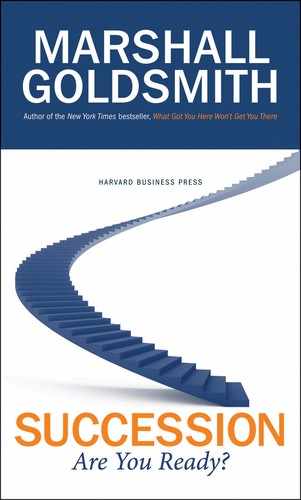Preface: Memo to the CEO
For three decades, I have had the privilege of working with over one hundred major CEOs and their management teams. In this memo I will share with you—a CEO who is nearing the end of his or her tenure—what I have learned from my years of practice in executive coaching. Hopefully, you can learn from my experience with other CEOs and not repeat some of the classic mistakes that I have observed over the years.
After you leave your role as CEO of this company, you may wish to coach other leaders. This memo should also help you in coaching entrepreneurs, executives, or professionals who are preparing for their career transitions. While some of our discussion relates exclusively to CEOs, most of this memo is applicable to any high-level professional transition.
From my observation, much of what has been written about CEO succession has little to do with the personal drama that actually transpires when it comes time to hand off the baton of leadership. “Academic” literature generally ignores the fact that CEOs—and their successors—are human beings. Very little of what is written deals with “soft” personal issues like relationships, self-interest, ego, or (God forbid) feelings!
Leadership succession is usually presented as a dry, “check-the-boxes” process during which seemingly robotic executives are only concerned with buzzwords like strategic fit, core competencies, and long-term shareholder value. These writings make an implicit assumption that CEO succession is completely impersonal, objective, and rational.
Wrong!
In actual practice, the process of getting ready for succession is often influenced by emotions as much as it is influenced by logic.
Almost no occupational group is more personally identified with their jobs than CEOs. When you are introduced, you are referred to as the CEO of your company. After a while, this is not just what you do—it becomes a very large part of who you are. At the CEO level, the transition process is far from impersonal—it is extremely personal!
One of my coaching clients described her emotional reaction, when she finally faced the reality of leaving her job, to a group of fellow executives from different companies: “I finally realized that my job had become my best friend.” She sighed, “It’s very hard to leave your best friend.” I watched the expressive face of this fantastic leader as she shared her personal feelings about leaving. The CEOs in the room were hanging on her every word.
“It seemed like I was getting promoted every few years. I loved the company, my coworkers, and our customers. Going to work was always a joy for me,” she smiled. Her face changed expression as she went on, “The time just flew by—and then one day it was time to leave. It hurt.”
The transition process will not only be “personal” for you. It will be “personal” for your successor, your other executives, your board, and all the other stakeholders whose lives you impact.
In the old Star Trek series, Leonard Nimoy played the role of Mr. Spock, a pointy-eared leader from Vulcan, a planet whose citizens prided themselves on pure objective logic and the absence of any “illogical” emotions. Many management texts are written as if the executives they are describing are Vulcans. Unless some clever plastic surgeons from Beverly Hills are doing ear reconstructions, I have never met a Vulcan CEO here on planet Earth!
A reason for this memo is to prepare you for the human side of CEO succession. You—like all of the other CEOs that I have met—appear to be a human being, not a cleverly designed android. Assuming that this observation is correct, you are likely to be subject to many of the same crazy, emotional, nonrational hopes and fears that plague the rest of humanity.
I am definitely not an expert on strategy, execution, or the “business” side of business. My PhD is in organizational behavior and my area of expertise involves the behavioral side of leadership. All of my suggestions will be limited to issues involving human behavior.
My goal for you is to get through the transition process in the most positive manner possible. I would like you to maintain your dignity (many don’t), enjoy your final year or so in the office, and put your successor in a position where he or she will have a great chance of winning.
I would like to help you help your successor develop the leadership skills and key relationships that he or she will need to succeed. The coaching process that I will describe has been proven to work—as a tool for achieving positive, lasting change in behavior, building stakeholder relationships, and increasing leadership effectiveness.
You are the CEO, not me. In this memo, I will do my best to give you suggestions based on my years of experience. At the end of the day, the “ownership” of how you manage this process has to come from you. Think about all of my suggestions, weigh them against your own years of executive experience, and choose a path for the development of your successor that fits your own unique background and skill.
